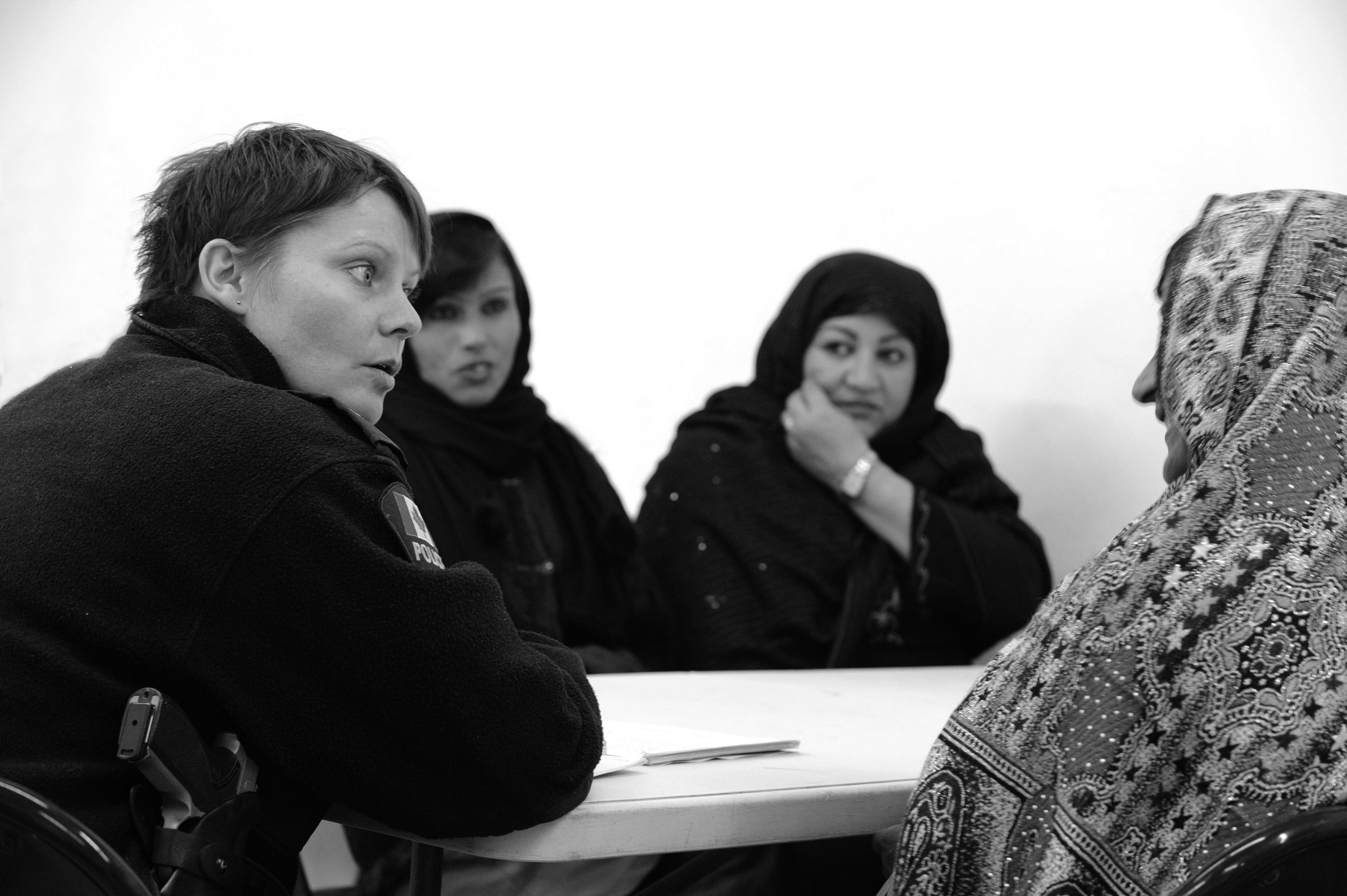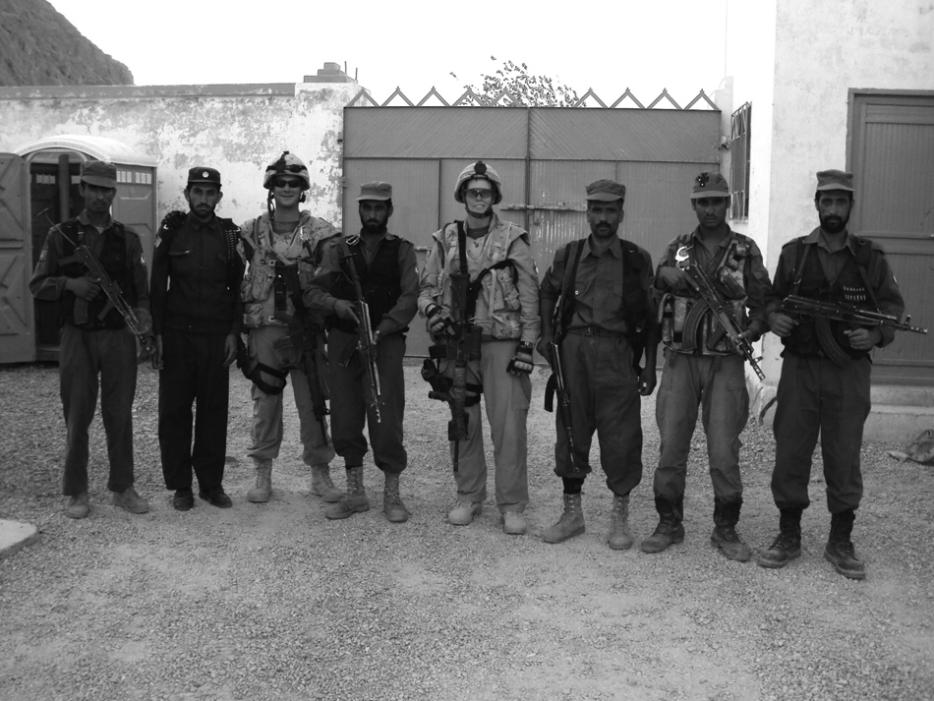In September 2010, in the push to triple the ranks of the ANP, General Jonathan Vance, the Canadian commander of Joint Task Force Kandahar, helicoptered into Panjwai to welcome the first class to attend a new police-training compound. Before the ceremonies began, Vance and his entourage of American and Afghan generals gathered with the local ANP commander, Colonel Karimi, in the District Centre beside the compound. They took seats around a boardroom table, with Vance at one end and Karimi at the other. As tea was being served, an RCMP corporal in brown fatigues slipped into the room and quietly sat in a chair against the wall behind Karimi. Candice McMackin’s junior rank kept her from a seat at the table, but her role as Karimi’s CivPol mentor gained her access to the boardroom. She was a tall, lanky Manitoban of thirty-seven, with rosy cheeks, bright blue eyes and blond boy-cut hair—quite a contrast to her student Karimi, who was a foot shorter, built like a fireplug and, with his balding pate, grey beard and craggy features, appeared old enough to be her grandfather.
The officers went around the table introducing themselves in order of rank until it was Karimi’s turn. “Before I speak about myself I would like to introduce someone the commanders in this room should especially honour,” Karimi said in Pashto. He paused for his language assistant to interpret his words for the Westerners, then leaned around and dramatically extended his hand to McMackin, who sat bolt upright in surprise. The looks on the faces of the Afghan generals seemed to say, The girl?
“Here I have this police officer, this female,” Karimi pronounced, with all the force and flourish he used to motivate cops on the parade ground. “She has chosen to leave her home and life in Canada to come to Afghanistan to make our policemen better people!” Placing his hand on his heart, Karimi described how McMackin taught investigation courses that he himself benefited from and that would form his curriculum for years to come. “At checkpoints, she teaches us the proper way to question suspects and gather information. In villages, she arranges meetings with elders so they disclose insurgent activity. Just last week a helicopter was shot down in front of her. It was she who led my men to defend their position until all were rescued by a Quick Response Force from Masum Ghar.”
For his peroration, Karimi swivelled in his chair and faced his young teacher. “On behalf of myself and the Afghan National Police, we thank you, Candice McMackin, for teaching us to be a professional force!”
As the translation concluded, Vance and the other Western generals darted astonished glances at one another, aware something profound had taken place before their eyes. It was a rare thing for a Pashtun officer to publicly thank a noncom in front of his superiors. It was unheard of for a veteran colonel to admit to a group of generals that a female eight ranks his junior and decades younger had taught him how to do his job.
Two months later, when McMackin was about to be transferred to Camp Nathan Smith to teach Criminal Investigation, she and Karimi posed for a picture. There are thousands of photos of Canadian police posing with Afghan cops, but there is probably only one where a female corporal has her arm casually draped around the shoulders of an ANP commander.
Karimi was the third Afghan colonel that McMackin had mentored in her seven months in Afghanistan. At CNS, she began mentoring her fourth—the one who would be taking over teaching Criminal Investigation at the Training Centre when the Canadians left Kandahar.
“Every society creates certain expectations about what women and men can and should do or say or how they can or should act,” reads the opening sentence to a section in the CivPol training manual on women’s rights. “As Peace Operations personnel, it is your job to promote high standards of equality between men and women.” Those standards, the manual continues, are set forth in the United Nations Universal Declaration of Human Rights and in international treaties signed by the countries that accept CivPol’s aid. Women have equal rights to education and to freedom of movement; they are entitled to marry whom they want and possess equal rights within marriage and in divorce proceedings; and they have the right to be protected against domestic and sexual violence through the strict enforcement of local, national and international laws.
In Kandahar, every one of those rights was routinely violated by men who believed that female subservience to patriarchal rule was normal, natural and dictated by Islamic law. Kandahari women were expected to submit to corporal punishment; stay within the confines of the family compound; remain illiterate unless given permission to attend school; agree to being married off to old men when they were as young as ten; and acquiesce to baad—the ancient practice of offering female relatives as payment to resolve disputes between families. While sexual assault was a crime punishable by death in Islamic law, the Sharia courts in Kandahar that prosecuted rape cases usually found that the victim had provoked her assailant by behaving immodestly. Married rape victims were often jailed for adultery and single women were sometimes forced to marry their rapists—that is, if the victim wasn’t murdered first by a relative who believed she had dishonoured the family.
There are thousands of photos of Canadian police posing with Afghan cops, but there is probably only one where a female corporal has her arm casually draped around the shoulders of an ANP commander.
Before she was assassinated in 2008, Malalai Kakar, the head of Kandahar’s Crimes Against Women Department, had attempted to side-step Sharia courts by using a secular Afghan law against assault to arrest wife-beaters, rapists and honour-killers, forcing them to defend themselves in civilian court. After her assassination, President Karzai eventually bowed to international pressure and issued a 2009 decree that categorized violence against women as a crime in Afghanistan’s penal code, carrying a sixteen-year prison sentence. Other provisions of the decree guaranteed women the right to pursue an education, set sixteen as the legal age for marriage and gave a woman the right to leave her home without the permission of her husband. When Karzai submitted his decree to Parliament for approval, however, a majority of MPs refused to ratify it because, they stated, it violated Islamic law by nullifying the rights of husbands and fathers to “protect” their wives and daughters. A powerful mullah declared that “one of the most violent acts against a woman” was to allow her to sing or dance on television.
There were some in the U.S. military who felt that pressure from the West to break these deeply ingrained patterns of patriarchal domination would alienate tribal chiefs, religious leaders and other power brokers needed to fight the Taliban. In its training manual, CivPol phrased its opposition to this logic: “The comment is often heard that ‘We are not here to change the culture.’ That may be true, but a Peace Operation, by its very presence, contributes to cultural change. Culture is always in a state of change. It is not static. Conflict accelerates changes in culture. As Peace Operations personnel, your job is to uphold what is fair and just, supporting those changes which are bringing more equality between men and women.”
To accomplish this cultural mission in Kandahar, CivPol mentors were ordered “to make sure that human rights principles are incorporated into the core training of the new police service, and are understood and applied by all police.” Lawyers from Kandahar’s Human Rights Organization were brought into Camp Nathan Smith’s Police Training Centre to teach those principles; CivPol actively lobbied the ANP and the Afghan Ministry of Interior to hire more female cops to fill the classes being set up for women at CNS; and, beginning in 2010, CivPol for the first time posted its female officers outside the wire to train street cops and their commanders, offering a global lesson both to Kandahar’s residents and to police that women were the equal of men in society and in law enforcement.
Candice McMackin had been working as watch-commander of the busy Thompson detachment in northern Manitoba when the International Peace Operations Branch phoned her in the fall of 2009 and informed her that her mission application had been accepted. Before she’d joined the Mounties at age twenty-two, McMackin had spent two years in the Canadian infantry and was confident she would feel right at home teaching cops amidst the gunfire and military hardware of Kandahar. She’d first begun applying for a mission in 2005 and had kept her name on the waiting list despite the facts that her husband’s brother, Scott Cullen, a soldier based in Panjwai, had been badly wounded in a 2006 suicide bombing that had killed four of his colleagues, and that in August 2009, a CivPol Mountie named Brian Kelly had almost lost his legs in a bombing that had killed or wounded a hundred civilians.
“A mission was the last big thing I wanted to do before having children,” she told me at CNS. “I’d talked to my brother-in-law, and he told me how desperately the Afghan police needed training so they could stand on their own. I really wanted to be a part of that, to teach what I’d learned to police who could possibly improve the future for their country.” She had heard the stories about the attitudes of Afghan males toward women, but from the age of three her dad, Phillip, a Mountie corporal, had advised her how to get along in traditional male territory, whether it was playing baseball and hockey with boys in school, serving in the infantry in 1993 when there were very few female combat soldiers, or policing some of the roughest postings in Manitoba. “I was very close to my dad growing up, and I still am. He taught me if you just go up to people, shake their hands, introduce yourself and joke around with them a little bit, they’ll become comfortable and forget the gender thing. If you give respect, you get respect back. Being respectful and showing you’d like to do a good job is just the right way to get along with people, whether you’re male or female. It’s what community policing is all about, and it’s what teaching community policing is all about.”
McMackin flew to Ottawa on January 9, 2010, and two days later began classes at the parklike campus of the Canadian Police College. Her roto of seventeen officers included two other junior-ranked females. One was “Sandy,” an undercover constable with the Ottawa City Police (because of her work infiltrating organized crime, her real name cannot be used); the other was an RCMP corporal named Karen Holowaychuk, a police science instructor at Depot in Regina.
Holowaychuk, raised on a farm in Stoney Lake, Alberta, had been a high school English teacher in Saskatoon before she’d joined the Mounties at age twenty-five. Unlike McMackin and Sandy, she had spent her thirteen years as a policewoman in relatively quiet postings— six years patrolling rural Musquodoboit Harbour in Nova Scotia, three at the Toronto Airport, and her last five at Depot. Her sergeant at the airport had been Joe McAllister, who had just returned from his posting in Kosovo and who proselytized the good CivPol was doing around the world to every cop working for him. McAllister left for another mission in East Timor a year later, and Holowaychuk began considering a mission as an option for herself. She was teaching in Depot when McAllister began his 2007 tour in Kandahar and started sending e-mail updates to all his colleagues. Turning her mind to the possibility of an Afghan mission, she read The Kite Runner, Descent into Chaos, Three Cups of Tea and A Thousand Splendid Suns. “What stood out in my mind was the horrible treatment of women in Afghanistan,” she told me. “I’d seen abuse in Canada and I felt, here’s an area where I would like to be of some help. So I applied for a mission, and in the fall of 2009 I got released from Depot for a year.”

On February 4 the roto mustered in the basement of the Department of Defence building to get “kitted out” for a combat zone. Their equipment included a tourniquet that allowed a badly wounded cop to tie off a mangled limb with one hand, and, for the females, a Freelax—an eight-inch shoe-horn–shaped device that enables a woman to pee while standing up. (“When you’re walking down roads with IEDs, you can’t go squatting in a ditch,” one of the women told me. “That piece of plastic is almost as important as your body armour.”)
The next day the roto travelled to Fort Irwin in the Mojave Desert for two weeks of scenario-based training with the military, then flew back to Ontario for another month of training at the Connaught Range in Ottawa, and finally, on March 24, commanded by Supt. Vic Park, flew off to Kandahar.
After two weeks of “in-clearance” training at CNS, McMackin, Holowaychuk, Sandy and fourteen CivPol males were deployed to Forward Operating Base Walton, named in honour of Joe McAllister’s dead friend Jim Walton. Located in the desert twenty kilometres from CNS, FOB Walton was a primitive fort of Hesco barriers, watchtowers and small plywood huts that served as barracks. The women were shown to a shack whose walls were lined with wobbly metal bunk beds. Above Holowaychuk’s bunk was a picture of a blown-up Humvee with the caption: “If it doesn’t kill you, drive on.”
The pin-up was an example of the gallows humour of the MPs in the U.S. 97th Battalion, who trained the ANP in even more primitive police substations that oversaw districts where Coalition vehicles were getting blown up all the time. Until the arrival of the CivPol officers, the ANP in those substations had received no training by civilian police. The women’s assignment was to embed in separate substations and mentor local cops and their commanders as they patrolled their districts.
McMackin, the ex-soldier, hit it off with her district commander, Colonel Lali Momma, and began mentoring him and his men in the compound and on dismounted patrols. Sandy, accustomed to relating to gruff men in criminal gangs, had a similar fraternal experience at her police substation. Holowaychuk, however, never connected with her commander, nor with his officers or the U.S. MPs who accompanied them on patrol. She was a small, slightly built woman with a high voice that she self-consciously suspected made her look and sound out of place in a combat zone. After a week of walking IED-blasted roads, she became more and more depressed at how little civilian police training she was offering. From her point of view, the MPs were mainly training the ANP to set up fighting positions that could withstand frontal assault, and not how to police communities. “I was just a tag-along,” she told me. “The Americans were nearing the end of their mission, they were tired, so there wasn’t enough energy and time to do the work that I would have liked to have done. They were so close to going home, they’d taken so many casualties and they just wanted to stay alive.”
Each evening she returned to face the shack she shared with the exhausted men. A small air conditioner kept the temperature at night just below thirty degrees, which did not help Holowaychuk’s mood. She often wept in her bunk, overwhelmed by loneliness, fear and a sense that she was accomplishing nothing to justify her presence in Kandahar. She had signed up for a CivPol mission because of her three passions in life: policing, teaching policing and wanting to help women. She wrote an e-mail to Vic Park explaining that she was engaged in military training, not police training.
At the end of her first two weeks, Park rolled in from CNS. He asked Holowaychuk if she would like to accompany a Montreal city policewoman named Annie Lacroix to Kabul for a fortnight to observe a contingent of Norwegian policewomen as they taught security awareness to a class of female ANPs. Lacroix had been teaching female ANPs at CNS, and would be rotating home in July. Park wanted Holowaychuk to monitor the Kabul class and perhaps incorporate it into a full-curriculum course she could develop and then teach at CNS and in Kandahar Police Headquarters. Holowaychuk leapt at the chance.
Two days later, she walked into a classroom in Kabul’s Police Headquarters. Until then the only Afghan women she’d seen had been shrouded in burkas as they walked silently behind men who put them out of reach of conversation with foreigners. In this classroom, all the women had slipped off their coverings. The first thing Holowaychuk noticed was how garrulous they were. Bursting with pride at being policewomen, they constantly expressed affection for one another and were among the most eager students Holowaychuk had ever met. This is what I’m here for! she thought. This is what I’m meant to do! Teach policewomen!
Bursting with pride at being policewomen, they constantly expressed affection for one another and were among the most eager students Holowaychuk had ever met.
Holowaychuk returned to her posting in the middle of May and spent her evenings after patrols e-mailing back and forth with Lacroix, drawing up a curriculum for women. When she met Afghan CivPol Commander Dave Critchley upon his arrival at CNS in the middle of June, she was filled with optimism about the future of her deployment. Two weeks later, when McMackin transferred from FOB Walton to Panjwai, Holowaychuk moved to CNS and began teaching ANP females full time. At the beginning of November, McMackin joined her at CNS, assigned to mentor the colonel who would take over teaching Criminal Investigation at the Training Centre.
McMackin and Holowaychuk were in the last two weeks of their deployment when I flew to Kandahar. For eight and a half months they had endured what some male Mounties had not been able to bear for two days. On the roto that had arrived in September, two middle-aged RCMP from the Prairies had been traumatized by the initial shock of the war. They had landed at Kandahar Airfield in the middle of a Taliban rocket attack and were ordered straight to the shelters. After another day of watching medevac helicopters landing with dead and wounded soldiers, the two cops had refused to join their colleagues aboard the chopper to CNS and had asked to be sent home. Critchley, their boss in Kabul, told me he didn’t judge them: when he’d first arrived in June he too had experienced the panicky feeling that he’d made a big mistake.
However much they were trained for a deployment, Critchley said, a lot of CivPol cops had to hang on day to day and sometimes minute to minute until they accepted that for the next nine months they’d be in the middle of a war ten thousand miles from their families. Most of them were two to three times the age of the soldiers around them and had lost the elasticity that allowed twenty-year-olds to put up with just about anything. Even if, like McMackin, they’d been in the military as youngsters, he said, CivPol cops had spent their entire adult careers as peace officers. At home they possessed the non-negotiable use of force, but they used it rarely and only to enforce the law when criminals violated it. A CivPol mission in Kandahar, by contrast, meant training the ANP surrounded by thousands of Taliban who were determined to kill police. “The change I’ve seen in some of them in the six months I’ve been here bothers me,” Critchley told me. “They’re not the same people. I don’t know how they’re going to process the war in their heads when they go home.”





